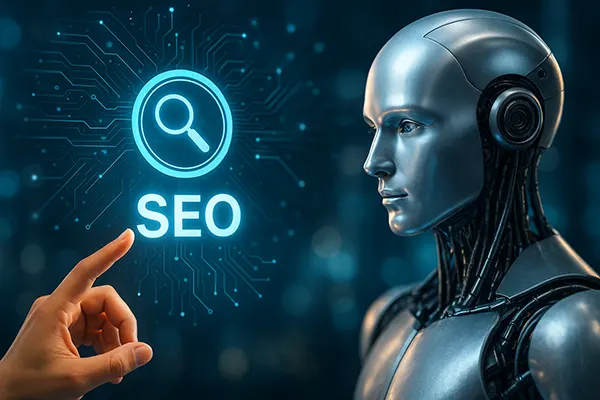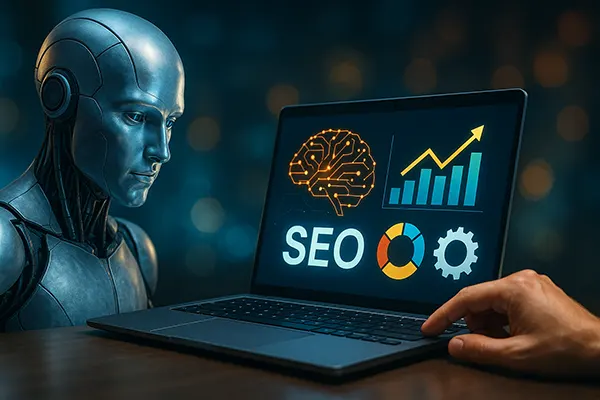
SEO in 2025: The Role of Artificial Intelligence in Search Algorithms
By 2025, artificial intelligence (AI) has fundamentally transformed the way search engines understand, evaluate, and rank content. The traditional methods of keyword density and backlinks are now secondary to user intent, experience, and trustworthiness. AI has become an integral element of modern SEO, improving not only search algorithms but also how digital marketers approach optimisation strategies.
AI and the Evolution of Search Engine Algorithms
Search algorithms in 2025 are no longer static or predictable. They continuously learn from billions of data points using machine learning and natural language processing. Google’s systems, such as BERT and MUM, have evolved into complex frameworks capable of understanding nuances, emotions, and contextual meaning. This evolution prioritises content that truly answers user questions rather than simply containing specific keywords.
Machine learning models now analyse user satisfaction through behavioural signals such as dwell time, interaction depth, and bounce rates. This shift means content creators must focus on experience, expertise, authoritativeness, and trustworthiness (E-E-A-T). Pages that offer verified information, strong references, and a clear purpose are rewarded with higher rankings.
Furthermore, AI-driven updates reduce manipulation in search results. Low-quality or AI-generated spam content is rapidly identified and demoted. The emphasis is on transparency—websites that clearly state authorship, methodology, and factual accuracy earn better trust scores and visibility.
How AI Shapes Content Creation and User Experience
AI no longer merely assists with keyword research; it helps craft entire content ecosystems. Tools powered by neural networks suggest semantic topics, predict user intent, and optimise article structure for readability and clarity. These systems analyse voice search patterns and mobile behaviour, enabling SEO professionals to tailor content for both conversational queries and micro-moments.
For example, voice-enabled searches have increased exponentially, and algorithms now interpret spoken questions differently from typed ones. Optimising for natural language and long-tail phrases has become essential. Websites that adapt to this linguistic evolution gain better engagement metrics and organic visibility.
Additionally, AI enhances accessibility and inclusivity. Search engines increasingly value sites that provide structured data, alt text for images, and seamless navigation. These aspects not only support accessibility compliance but also contribute to improved SEO performance in the long term.
Data-Driven SEO: Predictive Analytics and Automation
In 2025, data analytics is no longer a supporting tool but a central pillar of SEO. Predictive models anticipate user trends months in advance, allowing marketers to plan strategies around seasonal interests, algorithmic changes, and shifting search patterns. The fusion of AI with big data ensures that optimisation decisions are based on facts, not assumptions.
AI-based systems also automate repetitive SEO tasks. From meta tag optimisation to internal linking and crawl analysis, automation tools save time and reduce human error. This enables experts to focus on strategic creativity—developing value-driven content, storytelling, and digital branding that resonates with the audience.
Predictive SEO tools evaluate potential outcomes of content updates, helping marketers avoid penalties or ranking drops. By analysing historical data and search intent patterns, these systems recommend the most effective keyword clusters and technical improvements to sustain long-term visibility.
The Impact of AI on Technical SEO
Technical SEO has undergone a major transformation under AI’s influence. Search engines now rely heavily on entity recognition, schema markup, and contextual relationships between pages. Websites that maintain clean architecture, fast loading speeds, and secure protocols are prioritised. AI systems like Google’s Search Generative Experience (SGE) enhance how structured data contributes to knowledge graphs and featured snippets.
AI also supports real-time crawling efficiency. Instead of indexing every page equally, search engines use resource allocation models to focus on high-value and frequently updated content. This approach promotes sustainability and reduces data redundancy across global servers.
From mobile-first indexing to Core Web Vitals, AI measures performance through a holistic lens. Sites that deliver seamless, fast, and safe browsing experiences gain not only ranking advantages but also user trust—an increasingly critical factor in 2025’s competitive landscape.

The Future of SEO in an AI-Driven Era
The next stage of SEO evolution lies in the integration of artificial general intelligence (AGI) concepts. Search engines are beginning to personalise results at an unprecedented level, analysing user profiles, contexts, and real-time interactions. Ethical concerns, such as bias prevention and transparency in algorithmic decision-making, are now key topics for the industry.
AI will continue to redefine SEO as a multidimensional field that merges psychology, linguistics, and technology. The role of SEO experts will shift from technical implementation to strategic interpretation—understanding how AI perceives relevance and authority. Continuous adaptation will remain essential as algorithms become more autonomous and context-aware.
Ultimately, success in 2025 and beyond depends on authenticity. Genuine expertise, consistent updates, and verified information will outweigh manipulative tactics. The fusion of human insight with AI precision will define the new standard of search excellence.
Ethical SEO and Responsible Use of AI
As AI becomes deeply embedded in content generation and ranking, ethical SEO practices are gaining prominence. Transparency about AI involvement in writing or optimisation is increasingly expected. Google’s latest updates reward honesty and factual reliability over automation for automation’s sake.
Responsible SEO strategies now involve explaining how content is produced, citing credible sources, and maintaining accountability for accuracy. This approach not only aligns with E-E-A-T principles but also reinforces long-term trust between websites and users.
In conclusion, AI is not replacing human creativity—it is refining it. The symbiosis between technology and human expertise ensures that SEO in 2025 remains dynamic, fair, and genuinely beneficial to audiences seeking credible information online.
